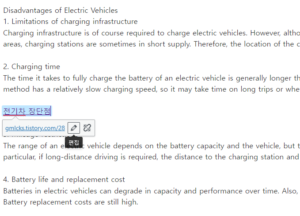전기차 장단점
Let’s learn about the pros and cons of electric vehicles today. Before that, an electric vehicle, as you know, is a vehicle that operates using electricity. There is a big difference from conventional internal combustion locomotives in that it does not have internal fuel and moves the wheels through an electric motor.
At the heart of these electric vehicles is the battery pack, which comes in a variety of sizes and capacities, and is usually located on the floor or rear of the vehicle. The battery pack stores electricity and supplies it to the electric motor to move the vehicle. Unlike these internal combustion engine vehicles, they have the advantage of not emitting exhaust fumes because they are driven purely by electricity.
At present, when the increase in carbon dioxide has been identified as the cause of global warming, countries are accelerating the development of eco-friendly vehicles (including hydrogen vehicles) centering on electric vehicles. there is. Now let’s look at the pros and cons of electric vehicles.
Advantages of Electric Vehicles
1. Environmental friendliness
One of the main advantages of electric vehicles is that they are environmentally friendly. Because it does not use an internal combustion engine, there is no exhaust gas pollution or exhaustion, thereby reducing the emission of harmful substances in the atmosphere and reducing air pollution and greenhouse gas emissions.
2. No noise.
Electric cars are quiet due to the characteristics of electric motors. Compared to vehicles with an internal combustion engine, the static noise level is lower, providing a more pleasant driving experience in quiet environments such as city centers and residential areas.
3. Energy Efficiency
Electric cars are powered by an electric motor, so they are more fuel efficient. Compared to a vehicle with an internal combustion engine, the energy conversion efficiency is higher, so less energy is consumed per kilometer traveled.
4. Low cost operation
Unlike internal combustion engine vehicles, electric vehicles have relatively low maintenance and operating costs. This is because electric vehicles do not require operations that are required for internal combustion engines, such as changing oil and replacing engine parts.
5. Charging Convenience
Electric vehicles can charge their batteries at charging stations, but charging stations are becoming more and more installed, and home charging infrastructure that can be charged at home is also becoming more popular.
6. Benefits and Incentives Policy
Many countries and regions have implemented incentives and preferential policies regarding electric vehicles to encourage the use of electric vehicles. For example, tax relief / road toll exemption / dedicated parking spaces / charging infrastructure support.
However, electric vehicles not only have many advantages, but also have disadvantages. Let’s find out more.
Disadvantages of Electric Vehicles
1. Limitations of charging infrastructure
Charging infrastructure is of course required to charge electric vehicles. However, although presently available, the number of charging stations is limited, and in some rural areas, charging stations are sometimes in short supply. Therefore, the location of the charging station must be taken into account when traveling long distances.
2. Charging time
The time it takes to fully charge the battery of an electric vehicle is generally longer than the refueling time of an internal combustion engine vehicle. The normal charging method has a relatively slow charging speed, so it may take time on long trips or when rapid charging is required.
3. Mileage restrictions
The range of an electric vehicle depends on the battery capacity and the vehicle, but the range may be limited compared to a vehicle with an internal combustion engine. In particular, if long-distance driving is required, the distance to the charging station and the charging time must be calculated together.
4. Battery life and replacement cost
Batteries in electric vehicles can degrade in capacity and performance over time. Also, the life of this battery depends on the charge and discharge cycles and the way you drive. Battery replacement costs are still high.
전기차 장단점
5. Battery weight and design
Batteries in electric vehicles also have a significant weight. This can affect the weight and balance of the vehicle, and depending on the size of the battery, there may be restrictions on the structure and arrangement of the vehicle, overall size, and body design.
6. Initial purchase cost
The initial purchase cost of an electric vehicle is relatively high compared to a typical internal combustion engine vehicle. However, through the government’s electric vehicle subsidy, it is possible to purchase it at a relatively low cost.
Today, we learned about the pros and cons of electric vehicles like this. As we enter modern society, I can easily meet people around me who are considering electric vehicles instead of internal combustion locomotives. Please refer to today’s article and think carefully about electric vehicles and spend a safe driving life. thank you!
